16 Jun 2015 | Malaysia, mobile, News and features
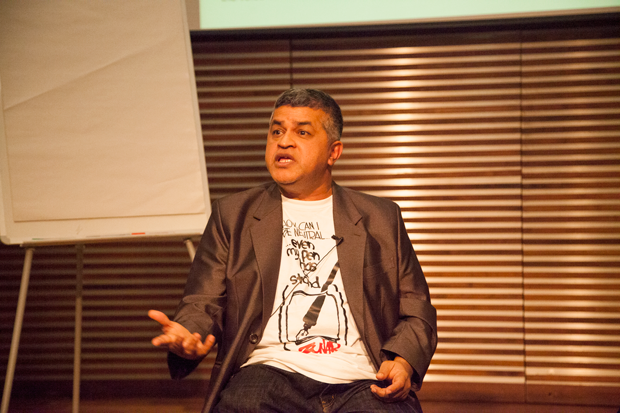
Malaysian cartoonist Zulkiflee Anwar Haque, aka Zunar, currently faces a record number of nine simultaneous charges under Malaysia’s controversial sedition act in a trial that is scheduled to begin on July 7.
Join Index in signing this petition for charges against him to be dropped.
Zunar has been repeatedly targeted for his editorial cartoons that critique the Malaysian government, which has banned much of Zunar’s work and repeatedly subjected him to raids, arrest and detainment.
Zunar, who joined Index at an event on cartoons and censorship in London in May, told Index: “The Malaysian government keeps taking giant reverse steps in terms of human rights and the right for expression. There is no light at the end of the democratic tunnel. I hope for freedom, but prepare to fight on.”
Index on Censorship has called on the Malaysian government to repeal the sedition act. “Malaysia is using an outdated and outmoded act to stifle free expression in the country,” said Index CEO Jodie Ginsberg. “We ask Malaysia to drop its case against Zunar.”
This was posted on 16 June 2015 at indexoncensorship.org
15 May 2015 | Malaysia, mobile, News and features
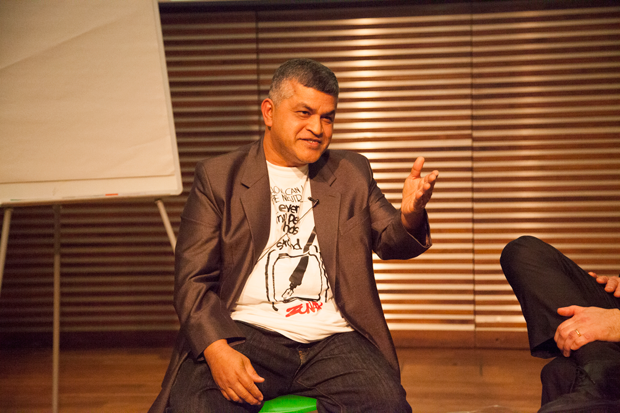
Malaysian cartoonist Zunar is facing charges under a colonial era sedition act. (Photo: Sean Gallagher/Index on Censorship)
Listen to the event here.
“The one thing the powerful cannot stand is laughter,” said British cartoonist Martin Rowson, speaking at an event with persecuted Malaysian cartoonist Zunar in London last night.
Citing the story of the emperor’s new clothes, and the revolutionary potential of the little boy who laughs out loud at what he sees, Rowson said he felt “very humbled” to be talking to a fellow cartoonist who could soon be condemned by his own government to spend the rest of his life in prison.
Zulkiflee Anwar Haque, aka Zunar, is currently facing a record number of nine simultaneous charges under Malaysia’s sedition act in a trial that is scheduled to begin on 20 May.
Originally enacted by British authorities in 1948, the sedition act is an old piece of colonial legislation which is being used to silence opponents and suppress free speech in a country where the ruling party has not changed in 57 years.
“Maybe here you have a government,” Zunar told a packed house at London’s Free Word Centre, “in Malaysia we have a regime… a cartoon government”.
Visiting London a week before his trial is due to open, 53-year-old Zunar remained upbeat despite the possibility of his spending up to 43 years behind bars.
Zunar took the opportunity to launch his recent book of cartoons, Ros in Kankong Land. Poking fun at Rosmah Mansor, the powerful wife of Malaysian PM Najib Razak, the book has been repeatedly barred from being launched officially in Malaysia.
With five of his books already banned for containing cartoons deemed “detrimental to public order”, his Kuala Lumpur office repeatedly raided, and publishers and bookstores across his country warned off printing or carrying any of his titles, censorship is an everyday challenge for Zunar.
Why carry on? Because he “wants to tell Malaysians that you are the ones who suffer from corruption”, ending the evening by drawing a cartoon depicting his fellow countrymen, propping up their regime and suffering painfully under the weight of their rulers.
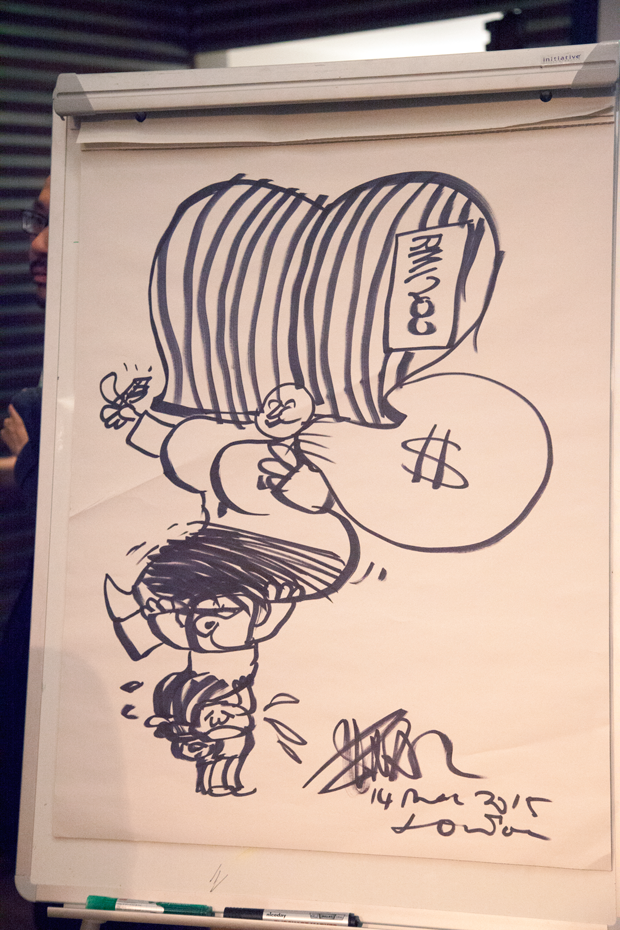
“Talent is not a gift. It’s a responsibility,” said Zunar, underlining his intention to “draw until my last drop of ink” and inviting “you all to join me in fighting this government”.
Discussing the power of cartoons to cut across divides universally, Rowson added an interesting perspective, telling the audience he had come to think his “purpose is not to shame politicians into resignation” but “to empower people to laugh at them”.
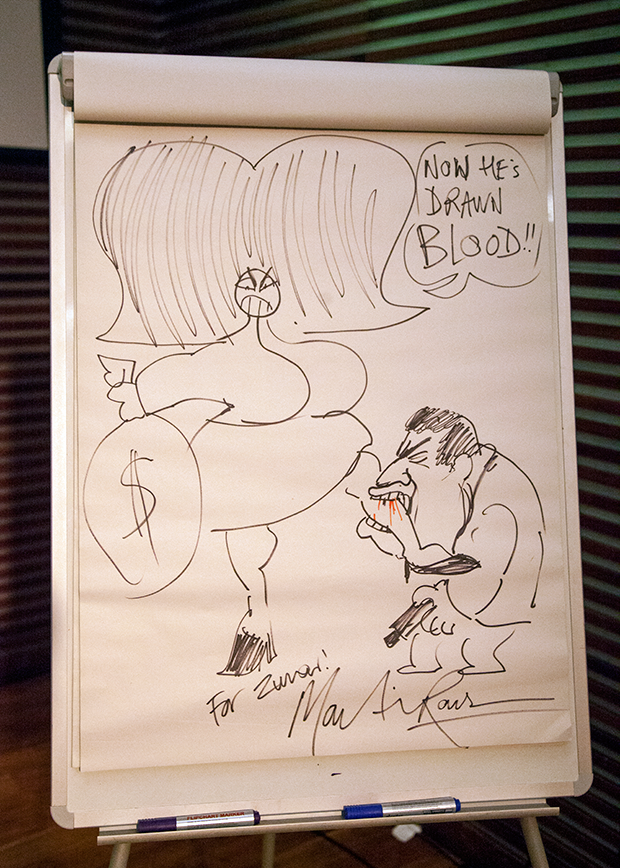
“I am a satirist and a cartoonist because I am offended,” offered Rowson, reflecting on whether there are any limits for cartoonists. “Why pinch when you can punch?” said Zunar, suggesting people mix up moral right and artistic right. “I saw cartoons of the prophet Muhammad and I didn’t like them all…”, but “if he was alive today, Prophet Muhammad wouldn’t have ordered cartoonists killed”.
How you can help Zunar
Zunar was visiting London to raise awareness of the situation for him and his peers. To call on the Malaysian government to drop all charges and renew its commitment to freedom of expression, you can sign this petition.
You can also buy Zunar’s latest book Ros in Kangkong Land at his website.
This article was posted on 15 May 2015 at indexoncensorship.org
29 Apr 2015 | Events, mobile
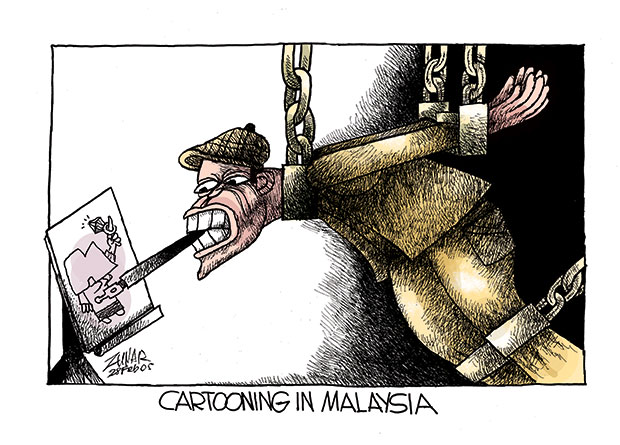 Malaysian cartoonist Zunar is currently facing 9 charges under the country’s sedition act, with a maximum penalty of 43 years imprisonment. Five of his books have already been banned, containing cartoons deemed “detrimental to public order”. Since 2009, his Kuala Lumpur office has repeatedly been raided, thousands of his cartoons confiscated and publishers and bookstores warned off printing or carrying any of his titles.
Malaysian cartoonist Zunar is currently facing 9 charges under the country’s sedition act, with a maximum penalty of 43 years imprisonment. Five of his books have already been banned, containing cartoons deemed “detrimental to public order”. Since 2009, his Kuala Lumpur office has repeatedly been raided, thousands of his cartoons confiscated and publishers and bookstores warned off printing or carrying any of his titles.
In a year when cartoons have rarely been far from the headlines, join us for an evening with an award-winning satirist who says “I will keep drawing until the last drop of my ink”.
One week before his trial in Malaysia, Zunar will be joined by political cartoonist Martin Rowson to share his story through words and pictures.
Where: Free Word Centre, London
When: Thursday 14 May 2015, 7.30pm
Tickets: Limited, booking essential – Book here
Related: Drawing pressure: Cartoons from around the world
Presented in partnership with Article 19 and supported by Free Word

7 Apr 2015 | Malaysia, mobile, News and features
Malaysian political cartoonist Zulkiflee Anwar Haque “Zunar” was charged with nine counts of sedition for tweets posted following a controversial court ruling. He could be sentenced to 43 years in prison if convicted. He pleaded not guilty. His bail was set at 13,500 RM (£2500.21).
Zunar had reported on 1 April that he has been told that he will be charged under the country’s sedition act.
“My lawyer had just informed me that the police had served a notice to charge me to court under the sedition act over my tweet posting dated 10 of February 2015 on Anwar Ibrahim ruling,” Zunar wrote in a statement ahead of the 3 April court date.
The cartoonist has been repeatedly targeted for his editorial cartoons that critique the Malaysian government, which has banned much of Zunar’s work and repeatedly subjected him to raids, arrest and detainment.
One of the tweets included a cartoon criticising Malaysian Prime Minister Najib Razak’s involvement in Ibrahim’s case. That case saw the country’s political opposition leader sentenced to five years for sodomising a former employee. Ibrahim says that the charges are politically motivated.
According to Zunar, the charge he expects on 3 April would be under section 4(1) C of the sedition act, carrying a maximum penalty of three years in prison, a £918 fine, or both. After he posted the tweet in February, he was arrested and detained for three days. During the detention, the police also opened up separate investigation on his cartoon books Pirate of Carry BN and Conspiracy to Imprison Anwar.
Zunar said that he has been advised by his lawyer not to comment about the case in detail.
“I would like to reiterate that the use of sedition act will not silence me. I will keep exposing the corruptions and wrong-doings of the government,” Zunar wrote.
“Index calls on Malaysia to drop these latest charges against Zunar, which are a blatant attempt to stifle free expression and dissent in the country,” Index on Censorship CEO Jodie Ginsberg said.
Zunar has been subject to official harassment for his work taking corruption to task.
On 28 January, Zunar’s office was raided while he was on speaking tour in London. Authorities confiscated more than 150 books. That raid was made under printing presses and publications act, the sedition act and the Malaysian penal code.
In earlier raids on his office more than 500 copies of Zunar’s books were confiscated in two separate raids to his office by the authorities. Authorities also targeted printers, vendors and bookstores around the country and their owners were warned not to print or sell Zunar’s books.
On 6 November 2014, three of his assistants were arrested and taken to the police station for selling his latest cartoon books. A few days later, the webmaster for Zunar’s website and online bookstore was called for questioning by the police under the sedition act.
The police have asked the online payment gateway that handles his book transactions to disclose the list of customers who have purchased his books through official website, zunar.my, according to Zunar’s statement.
On 20 November, Zunar was questioned at by Kuala Lumpur police from the classified crime section. That investigation was triggered by two complaints lodged against him.
This is Zunar’s second investigation under the sedition act for cartooning — the first was in September 2010, when he was arrested and detained for two days. In addition, five of his books — Perak Darul Kartun, 1 Funny Malaysia, Isu Dalam Kartun Vol. 1, 2 and 3 — were banned by the Malaysian home minister from 2009 to 2010.
In 2011, Zunar was conferred Courage in Editorial Cartooning Award by the Cartoonist Rights Network International
In his statement, Zunar pledged that his work against corruption will continue.
“The ‘Fight Through cartoons’ will carry on with more fire. I will keep drawing until the last drop of my ink.”
This post was published at indexoncensorship.org on 1 April, 2015





 Malaysian cartoonist Zunar is currently facing
Malaysian cartoonist Zunar is currently facing 